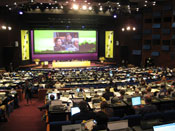EU proposals to list sharks under CITES down but far from out
Narrow margin of defeat makes reconsideration in Plenary likely

8 June 2007, The Hague. Conservationists are expressing hope that two proposals to limit international trade in shark species through the Convention on International Trade in Endangered Species (CITES) that were narrowly defeated today in Committee, will be resurrected and adopted during next week’s plenary session.
Proposals from the European Union to include spiny dogfish and porbeagle sharks under CITES Appendix II received 61% and 58% of the votes taken today, respectively. They needed 66% to succeed. Decisions of such a narrow margin, however, are often revisited during plenary sessions toward the end of the conference.
“We are disappointed that the shark proposals were not adopted today, but encouraged by the solid majority of votes they received,” said Sonja Fordham, Shark Alliance Policy Director. “We are hopeful that the European Union to re-introduce these sound proposals at next week’s plenary. We urge all Parties to attend the session and voice support for these urgently needed safeguards. CITES action is essential to international trade in these exceptionally vulnerable species is held to sustainable levels.”
Spiny dogfish are exported from all corners of the globe to satisfy European demand for fish and chips and smoked belly flaps. Porbeagle meat is among the most prized in Europe while fins are sent to Asia for use in shark fin soup. Spiny dogfish and porbeagle shark populations have been seriously depleted by targeted, poorly regulated fisheries. The IUCN (World Conservation Union) classifies both species as globally Threatened and Endangered in the US Atlantic, Critically Endangered in the Northeast Atlantic and Vulnerable globally.
Countries voicing support for the EU shark proposals during today’s debate included Algeria, Mexico, Israel and the United States. Representatives expressing opposition included Japan, China, New Zealand, and Canada.
Notes to Editors:
Sharks and closely related skates, rays and sawfish are especially vulnerable to overfishing and slow to recover from depletion because they generally grow slowly, mature late, and produce few young. Three species of sharks – white, basking and whale – are already listed under CITES, but the volume of trade in these species is dwarfed by that in spiny dogfish.
The Convention on International Trade in Endangered Species of Wild Fauna and Flora (CITES), also known as the Washington Convention, is an international agreement which aims to ensure the survival of individual species by managing their trade across international boundaries.
CITES provides an international legal framework for preventing trade in endangered species and regulating trade in species at risk. Currently, 171 countries are party to the agreement – and about 32,000 animal and plant species are afforded protection as a result.
CITES Parties convene every two to two-and-a-half years to amend three Appendices under which species at risk are listed. Proposals to list, down-list or de-list species are proposed by Member governments and require a two-thirds majority for adoption.











